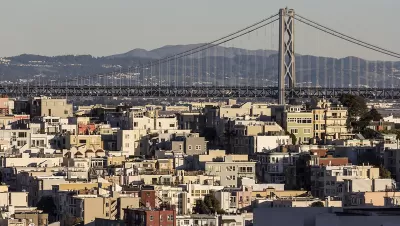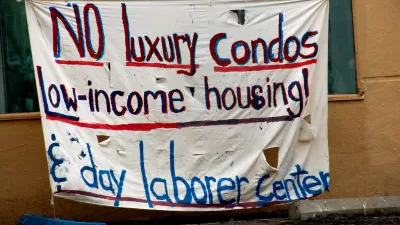While most Bay Area communities are pursuing housing solutions "individually," local planners acknowledge the need for strategies that address the regional as a unified whole.

"Though each of the Bay Area's nine counties and 101 cities is experiencing the region's housing crisis differently, the message from local planners is unified and clear: the problem demands a regional solution," Emma Zehner writes for the Lincoln Institute.
Discussing a meeting of eight Bay Area planning directors at this spring's annual APA conference, Zehner writes that as certain places (like San Francisco) add jobs at a breakneck pace, "other cities in the region are beginning to step up to create new regional job centers where housing is more readily available or where there is still the flexibility to add additional units."
San Jose, for instance, "has significant untapped housing potential as 94 percent of its residential land is currently zoned for detached single-family homes." At the same time, "San Jose faces a different type of imbalance: only nine percent of the city's land is devoted to employment uses." A new jobs center in San Jose could relieve pressure on San Francisco. So could locating more jobs in Oakland.
The planners acknowledged that even as job centers grow, the housing issue also depends on transportation. "If we could get to and from job centers more efficiently, it could solve some very significant problems for us," said Al Savay, community and economic development director for San Carlos.
Also discussed were ADU regulatory reform, inclusionary zoning, and potential for overarching state legislation.
FULL STORY: Housing Affordability: Regional Strategies to Address the Bay Area Affordability Crisis

Maui's Vacation Rental Debate Turns Ugly
Verbal attacks, misinformation campaigns and fistfights plague a high-stakes debate to convert thousands of vacation rentals into long-term housing.

Planetizen Federal Action Tracker
A weekly monitor of how Trump’s orders and actions are impacting planners and planning in America.

In Urban Planning, AI Prompting Could be the New Design Thinking
Creativity has long been key to great urban design. What if we see AI as our new creative partner?

How Trump's HUD Budget Proposal Would Harm Homelessness Response
Experts say the change to the HUD budget would make it more difficult to identify people who are homeless and connect them with services, and to prevent homelessness.

The Vast Potential of the Right-of-Way
One writer argues that the space between two building faces is the most important element of the built environment.

Florida Seniors Face Rising Homelessness Risk
High housing costs are pushing more seniors, many of them on a fixed income, into homelessness.
Urban Design for Planners 1: Software Tools
This six-course series explores essential urban design concepts using open source software and equips planners with the tools they need to participate fully in the urban design process.
Planning for Universal Design
Learn the tools for implementing Universal Design in planning regulations.
Gallatin County Department of Planning & Community Development
Heyer Gruel & Associates PA
JM Goldson LLC
City of Camden Redevelopment Agency
City of Astoria
Transportation Research & Education Center (TREC) at Portland State University
Jefferson Parish Government
Camden Redevelopment Agency
City of Claremont





























